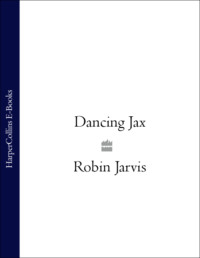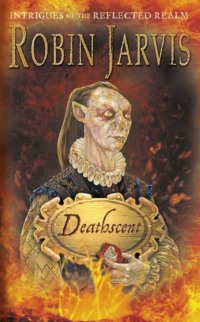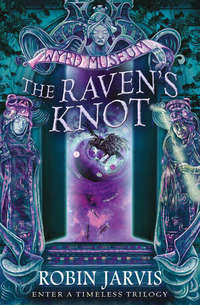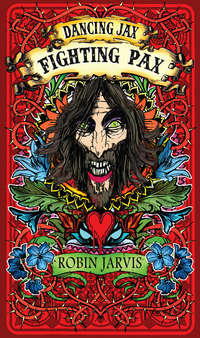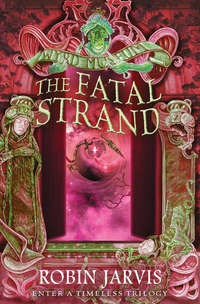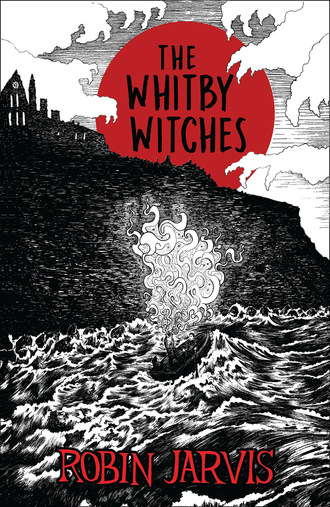
Полная версия
The Whitby Witches
‘That is the West Cliff,’ said Miss Boston as she negotiated her way through a crowd of giggling girls. ‘Traditionally the East Cliff was for the fishermen and the West for the holidaymakers. Of course it’s got a little mixed up over the years; most of the fishermen can’t afford to live here any more so they have to travel in.’
They reached the far side of the river. ‘Down there is Grape Lane,’ indicated Miss Boston, waving her hand.
The buildings of the East Cliff were more densely bunched together than Jennet had at first thought. They had been built in the days before planning permission was heard of and their higgledy-piggledy clusters formed a vast number of dark alleys, lanes and yards. The Whitby of the East Cliff was gazing at the world from an earlier time all its own.
Miss Boston led them up a narrow cobbled road called Church Street. It was the main thoroughfare of the East Cliff, yet still cars had difficulty making their way down it. Old buildings hunched over on either side in a forbidding manner and tiny lanes led off through sudden openings to unseen doorways.
‘Afternoon, Alice.’ A thin, elderly woman greeted Miss Boston courteously. She had the palest blue eyes that Jennet had ever seen and her silvery hair was scraped tightly over her head, to be bound in a fist-sized bun at the back. She wore a grey cardigan over a lemon yellow blouse, fastened at the neck by a cameo brooch, and clasped a brown handbag primly in front of her.
‘Oh, Prudence,’ returned Miss Boston hastily. ‘Did you manage to come across that book?’
The other shook her head and sniffed. ‘Sorry, Alice – must have thrown it out with Howard’s things after all. Never kept much of his stuff you know.’ Her voice was clipped and precise. Then she regarded the children and waited for an explanation.
‘My guests, Prudence: Jennet and Benjamin.’
‘Yes, well. They’re younger than I thought. I hope you know what you’re doing.’ She then continued the conversation, ignoring the children completely. ‘Actually, Alice, I have just come from your cottage. That Gregson woman told me you were not at home.’ She shook herself and adjusted the cameo. ‘So I was about to take myself off to call on Tilly. Haven’t seen her for over a week – more kittens I imagine. It’s all getting too ridiculous. Well, must cut along. Goodbye.’ And with that, she walked briskly away.
‘Don’t forget Sunday,’ Miss Boston called after her.
Without slowing her brisk stride the woman raised her hand dismissively and called back, ‘Naturally.’ Then she was lost in the crowds.
Miss Boston turned back to the children and sucked her breath in sharply. ‘That was Mrs Joyster,’ she informed them. ‘Rather a cold woman, I’m afraid – husband was army and it rubbed off on her. Sometimes I feel as though I’m being drilled when she talks to me. Mind you,’ she added, ‘she can be very pleasant at times.’
The bicycle began to clatter once more. ‘I recall how I used to hate it when adults pretended I wasn’t there; dear me, that was a long time ago now. Do you prefer blackberry or raspberry jam? I confess I have a passion for both – especially on hot scones. My cottage is not far now.’
Jennet and Ben were beginning to find Miss Boston’s abrupt changes of thought bewildering. It did, however, occur to them that they would have no difficulty polishing off a plate of jammy scones.
An odd, square building on the left caught their attention. It was set a little apart for one thing. Pillars supported the upper storey and right at the top, in the middle of the roof, was a clock tower and a weather vane shaped like a fish.
‘This is Market Place,’ said Miss Boston, waving a proud hand. ‘If you’re keen, you could go on this.’ She pointed to a black sign with white letters advertising a Ghost Tour.
Ben’s eyes widened and he swallowed nervously. The sign drew him like a powerful magnet. Jennet pulled him roughly away as if from a fire.
‘No!’ she told the old woman. ‘We don’t like that sort of thing at all.’
If Miss Boston was surprised by the severity of Jennet’s outburst then she did not show it. ‘Really, dear?’ she said mildly. ‘Then I’m afraid you have come to the wrong place entirely. You know I sometimes think Whitby has more ghosts than living residents.’ She waggled her chins at the sign and muttered. ‘Just as well, really – I’ve been banned from going on the tours anyway. Well, the young man who runs them seemed to resent my chipping in. Got quite irate once when I corrected him. He gave me my money back on the proviso I never bothered him again. Astounding state of affairs.’
They had come to another of those sudden openings and Miss Boston wheeled her bicycle through it. After about five metres the alley opened out into a spacious yard. She walked up to a flight of steps, rested her bicycle against a rail, opened a green door and said, ‘Well, come in then.’
Jennet was downstairs, talking to Miss Boston. Ben lay on an embroidered quilt and stared at the primroses in the wallpaper. It was a small room but just big enough for him, and for a change, he had it all to himself. There was a bed, a chest of drawers next to it with a lamp on top and a small wardrobe. He licked the jam from his chin and rolled over to gaze at the sloping ceiling.
It was a funny house. There were lots of weird prints on the walls and old sepia photographs of Victorian Whitby. There were also a good many corn dollies hanging up all over the place. A table in the hall was reserved for things Miss Boston had found while out walking: pine cones, bright orange rosehips, a bunch of heather, sheep’s wool found in a hedge, complete with twigs and fragments of leaf, the broken shell of a blackbird’s egg, several interesting pebbles, a gnarled piece of driftwood and a white gull’s feather.
This was not what he or Jennet had expected, and it certainly disproved the idea that Miss Boston was rich – unless she kept a secret stash of tenners under the mattress. It was not the sort of house you would expect an old lady to live in, whether she was rich or not. There were no china shepherdesses or rows of dainty cups, no bits of fussy lace, no piles of women’s magazines heaped in the corner, no obvious signs of knitting, no fat lazy cat sprawled on the sofa clawing away at the cushions and – best of all to Ben – the place did not smell of lavender. He thought he would like it here. Miss Boston was not the average old lady; there was something vital and a little bit eccentric about her.
An idea came to him as he lolled on the bed. Gingerly, he crept out of his room and went into Jennet’s. He could still hear the faint hum of voices downstairs so he knew he was safe.
Ben fumbled with the zip on the blue canvas bag and delved through piles of neatly folded clothes and small treasures. There, right at the bottom, his groping fingers touched what felt like a book. Gently, he slid the photograph album out of the bag and stroked it lovingly with his hands. With great care and reverence he opened it and turned the pages. This was a hallowed thing to him and Jennet and lately she had been withholding it from him.
There were his mother and father on their wedding day, smiling up out of the album, about to cut the cake. Another page and there they were on honeymoon in Wales. Ben’s father was a tall man with thick, dark hair and a broad grin. His mother, a petite blonde, had blinked at the wrong moment, and here she was, frozen into an eternal doze. The opposite page showed Jennet when she was a baby, sitting on her father’s lap.
Ben examined the photographs carefully. Here they were: images of his parents locked in happy events – birthdays and holidays sealed into the album forever. But the eyes staring out at him were unseeing. They were focused on the person taking the photograph and that had never been Ben. His mother and father were looking out at someone else, not him. He was confused. The memories of who they had been – everything they were – were now transferred to six inches by four of glossy paper.
He turned the last page. There was the photograph he sought above all. A younger version of himself sat astride a donkey on the sands of Rhyl and beside him were his mother and father. Jennet must have taken the picture. Try as he might, Ben had no memory of the occasion. He imagined sitting on a donkey and hearing his father’s voice, but no – there was nothing there. The photograph had been taken on the final day of their last holiday together. Six months later both his parents had been killed in a car accident.
Ben closed the album, then frowned and chewed his lip. He understood that his parents were dead. He and Jennet had gone to the funeral and watched the coffins lowered into that deep hole. He remembered that because he had worn those shoes that pinched and Jennet had cried a lot and had to be put to bed. Yes, his parents were dead; everyone told him that. So why was it that every now and then, in a mirror or at the end of his bed before he went to sleep, he could see his mother and father smiling at him?

II
EURYDICE
‘I knew your dear mama’s aunt,’ said Miss Boston, above the buffeting wind.
Jennet sat on the tombstone and hugged her knees. ‘Great Aunt Connie?’
Miss Boston held on to her hat and nodded. ‘She was one of my pupils,’ she said. ‘A good student but never made any use of her education – shameful waste.’
‘And you say she wrote to you about Ben and me?’
‘Yes, over the years we have kept a correspondence going. She was very fond of your mama, you know, and when she heard about the accident, well . . .’
They had climbed the hundred and ninety-nine steps to the top of the East Cliff in order to see the abbey, only to find it was too late and the man in the office had gone home. Still, there was plenty to see. At the top of the steps was St Mary’s church, a solid building surrounded by ancient graves whose stones were nearly worn smooth. They had settled themselves on a large, mossy tomb while Ben ran off to play among the stones and lean into the strong wind.
There was a magnificent view of the town below. On the West Cliff, directly opposite, bedroom lights were flickering on and the glitter of the arcades was becoming more noticeable in the gathering dusk. Dark night clouds were moving in from the sea and the sun was pale and low, catching a last, weak glint from the tiled roofs before it set.
Miss Boston, wrapped in a tweed cloak, stared at the horizon and said, ‘Of course, if Constance had not been in that home she would have taken you and Benjamin in herself.’
Jennet spoke into the darkening sky, tilting her head back and sweeping the hair out of her eyes. ‘She couldn’t have coped with Ben and me, she’s too old.’
Miss Boston snorted. ‘Too old? My dear girl, Constance is a mere sapling compared to me.’
‘But Aunt Connie’s seventy and walks with a frame.’
Miss Boston puckered her face up and asked, ‘How old do you think I am, child?’
Jennet looked at the figure blanketed in sage-green tweed. Only the face was visible and it was difficult to put an age to it. Miss Boston’s skin was lined, yet one grin could banish the wrinkles. Only the tufts of white woolly hair poking out beneath the hat gave any real clue to her age.
‘Seventy-five?’ Jennet ventured uncertainly.
Miss Boston closed her eyes and raised her head. ‘I am ninety-two,’ she solemnly informed her. ‘Don’t be alarmed, dear – some of us do survive for that length of time.’
‘But you’re not frail or anything,’ Jennet declared in surprise.
‘As to that,’ Miss Boston lifted a finger to her nose in a gesture of secrecy, ‘I have little methods all my own. Old age is terribly unfair. Usually either the mind or the body succumbs. Hospitals and nursing homes are filled with shambling near cadavers who still possess all their marbles; intelligent people who can’t go to the bathroom by themselves or even get out of bed, in some cases. Then there is the other variety: the sprightly gibberers, I call them, senile but with perfectly healthy bodies. What a cruel joke old age is, to be sure.’
A flock of gulls soared out over the sea, spreading their wings and hanging on the air. Miss Boston followed their course with interest. ‘They’re not supposed to be able to fly over the abbey, you know,’ she told Jennet. ‘Legend says that if they try, they are overcome and fall to the ground. There they must pay homage to St Hilda, the founder of the abbey, until she releases them.’
‘That’s silly,’ said Jennet.
Miss Boston agreed. ‘I suppose so, but it is a lovely notion, don’t you think? St Hilda was a remarkable woman, after all.’
They sat in silence for some time, listening to the wind rushing through the grass and hearing Ben’s squawks as he chased the gulls.
‘Why now?’ asked Jennet, breaking the calm. ‘Why didn’t you send for us before? Why wait over two years?’
The old woman put her hand on Jennet’s and explained. ‘After the accident, Constance wrote to me and told me you had gone to stay with your father’s brother.’
‘Uncle Peter, yes – and Aunt Pat, his snotty wife.’
‘You were with them for just three months, were you not?’
Jennet stared at the ground and mumbled, ‘Aunt Pat said she couldn’t cope with . . . well, with us.’ She hesitated before adding, ‘Ben was having a bad time, and there were other things.’
‘I see.’ Miss Boston turned to watch Ben playing. ‘So they put you both into care.’
‘Yes, then we were put with another family who actually wanted to adopt Ben and me, until . . . well, it didn’t work out that way.’
‘No.’ Miss Boston narrowed her eyes thoughtfully. ‘Nor did it work out with three other families after that. You asked why I had not sent for you before now. My dear child, I was hoping that you would find a good home with a family who would care for you.’ She sighed loudly. ‘Alas, it was not to be, so I decided to enter the fray and applied a little pressure here, called in some old favours there. Well, here you are; stuck with a terrible old woman like me. I’m sorry, but I could not stand by and let you stay in that hostel until you were sixteen.’
Jennet shifted uncomfortably on the tombstone. This woman had no idea why they had been unable to fit in. She looked round for Ben and suddenly saw that he was dangerously near the cliff edge. ‘Will he be all right there?’ she asked in alarm.
‘I think your brother has brains enough not to go leaping off cliffs,’ remarked Miss Boston. ‘Of course, he might get blown off. The wind is notoriously strong up here.’ She raised a hand and called the boy to them. ‘Do you know it gets so violent sometimes that it actually lifts the lead off the church roof ? Last winter the vicar had to cancel the service because of the noise.’
Ben began to make his roundabout way towards them. Miss Boston cleared her throat and said to Jennet, ‘I think I ought to tell you something before he rejoins us. It’s only fair you should know. You’ve a sensible head on your shoulders, too sensible perhaps at times.’
‘What should I know?’
‘I received a letter from Mrs Rodice.’ Miss Boston pulled a sour expression. ‘Nasty, spiteful letter it was too. It concerned Benjamin. What an unpleasant creature she must be.’
The colour drained out of Jennet’s face and she dug her nails into the palms of her hands. ‘What did the letter say?’ she asked shakily.
Miss Boston snorted her contempt. ‘She is obviously an ignorant woman – unbalanced too, I shouldn’t wonder. She accused Benjamin of certain things which I refuse to believe. I threw the wretched piece of paper on the fire – wish I could do the same to her.’
The girl glanced up and found Miss Boston looking at her steadily. Now was the time to tell her everything. If that was the end of their stay in Whitby, then so be it; at least she could put the old woman straight. Lord knows what the Rodice had put in that letter.
‘Ben has dreams,’ she stammered. ‘Sometimes he has them in the daytime and he gets muddled up. He used to think Mum and Dad came to see him after the accident. That – that’s not all. He used to tell some of the other kids at the hostel funny stuff that frightened them. We had a new girl come who used to live with her gran before she died and Ben told her that he could see an old woman sitting next to her when she was in the TV room, stroking her hair. Apparently that’s what this grandmother used to do. Yvonne started to wet the bed after that and the other kids used to look at Ben like he was some kind of freak.’
‘Go on,’ Miss Boston prompted her gently.
‘Well, that’s why we never settled down with the foster families. With Aunt Pat, the last straw came during one of her posh dinner parties. Ben came running downstairs saying he’d seen Mum. Aunt Pat went dead red; she hated the embarrassment of it, she didn’t want anyone to think she had a retarded relative in the house. I heard her and Uncle Peter talking one night – their room was next to mine and the walls were thin. She said she couldn’t stand it any more, and Uncle Peter had to go along with her. It was horrible listening to them discussing us like that. I wanted to shout out that I could hear them but I never did.
‘The other families were the same. One lot were really religious and thought Ben was possessed or something and the others just looked at us funny.’
Miss Boston frowned. ‘Yes, I can see that some people might not feel comfortable with that sort of thing – it unnerves them and upsets their established ideas of the universe.’
‘It got really bad, though, at the hostel,’ Jennet continued. ‘About three weeks ago Ben goes and tells the Rodice he’s seen a man on the stairs. Course, there was nobody there but Ben describes the man to her and says he told him his name was Donald. She got all angry and shook Ben, calling him a liar. He had bruises on his arms where she’d grabbed him. That frightened her, that did – they’re not supposed to hit us, see. Well, after that she had as little to do with us as possible and I actually saw her shudder when Ben pushed past her once.’
Miss Boston put her arm around the girl and tried to comfort her. ‘Well, it won’t bother me, I assure you, dear. Benjamin can natter to an army of ghosts and I shan’t mind – I’m nearly one myself, after all. Tell me, do you ever see anything like that?’
Jennet shook her head. ‘No. At first I thought Ben was making it all up to annoy Aunt Pat, but he wouldn’t have kept it up this long, would he? I’ve told him to stop but he won’t.’
‘Of course not, dear – he cannot. It is the most natural thing in the world for him to see these things. I believe Benjamin is a very special child. He has “the sight”, a marvellous gift which should be encouraged. He must not feel that it is something to be ashamed of or he will lose it. Yes, he is special – and so too are you, Jennet. Throughout all this you have stood by him and protected him, even though you did not fully understand yourself. You are a very brave girl.’
At this point Ben sauntered up to them. ‘Come here, Benjamin,’ said Miss Boston. ‘Get under my cloak and I shall tell you a tale. You, too, Jennet.’
The children huddled up to the old woman and sheltered from the bitter wind like chicks under their mother’s wings.
‘Do you see that?’ she asked them, nodding to a tall, thin cross. ‘That is Caedmon’s cross.’
‘Who’s he, then?’ Ben wanted to know.
‘Ah,’ Miss Boston explained, ‘Caedmon was a cowherd, long before the Normans came. He used to tend the cattle on the plain back there when the abbey was just a monastery. He was painfully shy and awkward, poor fellow. In the winter when fires were lit and songs were sung around them, all the other servants of the monastery would do their party pieces, except Caedmon. He felt so unhappy because he could not sing that he would retire early and his friends would shake their heads and feel sorry for him.
‘Then, one night, a vision came to him in a dream. It was an angel, which bade Caedmon sing of the glories of God the Maker. Do you know, when he awoke he felt confident as never before and began composing his own verse. Caedmon is recognised as the first English poet.’ And Miss Boston ended her tale with a satisfied sigh.
‘That’s soppy,’ sneered Ben, greatly disappointed.
‘You impudent rascal,’ cried Miss Boston with mock severity. ‘And what kind of stories do you like, may I ask?’
‘Scary ones – with monsters,’ he whispered conspiratorially.
Miss Boston’s face became grim as she shook her head and gasped, ‘You mean you don’t know? Have you come here unprepared? Did you not pack your garlic?’
Ben squirmed happily on the tomb, shaking his head. ‘Why?’ he giggled.
‘Because, child,’ she moaned in a horrified voice, ‘the most dreadful monster ever created came ashore at Whitby – Dracula himself, King of Vampires!’
‘He didn’t!’
‘Oh yes he did, young man – he changed himself into a great black dog and jumped from the doomed ship Demeter as she ran aground, just down there.’ Miss Boston paused for dramatic effect and they all stared down at the rough sea. ‘Now,’ she said in a bright, cheerful manner, ‘it’s getting colder – let us return home. Don’t pretend to be a vampire, Benjamin, you haven’t got the cloak for it.’ And she flapped her own, although she resembled a large green chicken more than a bat. Benjamin, however, was still staring down at the rocks below. He seemed to be watching something.
The old woman squinted down and saw a blurred shape move quickly over the stones. ‘So,’ she whispered to herself, ‘he sees the fisher folk also.’ A slow smile spread over her face.
Jennet waited for them at the top of the steep flight of steps. ‘Did Dracula really live here?’ she asked nervously.
Miss Boston chuckled. ‘Dracula is but a character of fiction. His creator, Bram Stoker, came here in 1890, a dozen or so years before I was born. Mind you, the black dog was a grisly creature of legend he borrowed from the locals – the Barguest. As big as a calf with fiery red eyes, it was supposed to stalk through the streets of Whitby in the dead of night. Anyone who heard it howling was doomed.’
Jennet shivered. ‘That’s horrible, Miss Boston.’
The old lady sighed. ‘Really, Jennet, you must stop calling me Miss Boston; I gave up lecturing a long time ago. My name is Alice.’
‘I can’t call you that. It doesn’t sound right.’
‘Then how about Aunt Alice? Will that do?’
Jennet simply smiled in reply and slid her hand automatically into Aunt Alice’s.
The seagulls woke Ben up; for a moment he wondered where he was and then he remembered. Hastily, he pulled his clothes on and ran downstairs to the kitchen, where he found Jennet finishing off a boiled egg.
‘Those seagulls are a bit loud, aren’t they, Jen?’ he said chirpily.
Jennet blinked at him wearily. ‘It’s seven in the morning,’ she answered grumpily. ‘I’ll never get used to this.’
‘Where is she?’ asked Ben, heaving himself on to a stool.
Jennet emptied the eggshell into a pedal bin and rinsed her plate under the tap. ‘She went out ten minutes ago. Says she always goes for a walk before breakfast.’
‘Where’s mine?’ demanded Ben hungrily.
His sister poured some milk into a bowl of cereal and passed it to him. Ben picked up a spoon; it was an odd colour and he sniffed it suspiciously.
‘It’s nice here, isn’t it, Ben?’ said Jennet as she watched him munch his breakfast.
‘Um,’ he agreed, with his mouth full.
‘I hope we can stay here for a while; she’s a nice old lady. I feel a bit funny calling her “Aunt” though.’
The latch on the front door rattled and Aunt Alice stepped in looking windswept and rosy. She stayed in the hall to hang up her hat and coat.
‘Don’t like these spoons, Jen,’ hissed Ben, waving his in the air.
‘Shush! They’re probably made of silver and very old – behave.’
Aunt Alice entered, undoing the top button of her blouse. ‘There,’ she puffed. ‘I like to climb the hundred and ninety-nine steps, whatever the weather. Blows the sleepy cobwebs away, it does.’ She bent down and opened the door of an old-fashioned refrigerator. ‘Now,’ she mumbled, ‘will it be kippers today or scrambled eggs? Kippers it is!’


